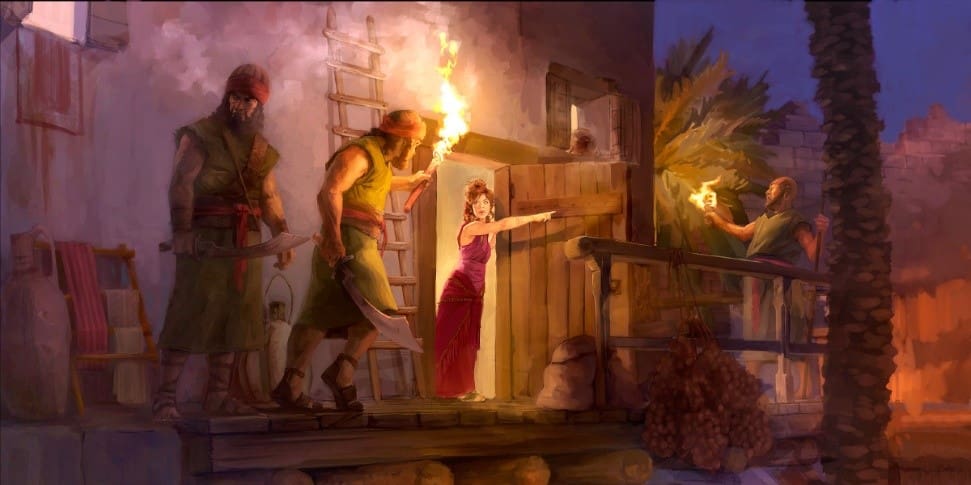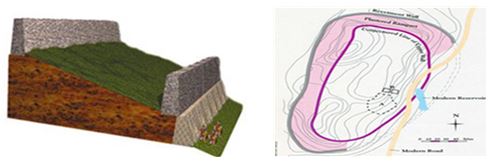The Five Women in the Lineage of Jesus
“Rahab: A Woman of Faith” Matthew 1:1-17, Joshua 2:1-14

Old Testament Readings: Psalm 130:1-8, Jeremiah 31:31-34
New Testament Reading: Luke 1:68-79
The Five Women in the Lineage of Jesus
“Rahab: A Woman of Faith”
Matthew 1:1-17, Joshua 2:1-14
Wayne J. Edwards, Pastor
Because of her profession, Rahab, a Canaanite woman, was always identified as a harlot.
- Because of her expressed faith in a forgiving and merciful God, Rahab became a heroine to her family, the first Gentile to be welcomed into God’s family, and one of the mothers in the lineage of Jesus.
- Even though she was a Gentile, the writer of Hebrews included Rahab in the Hebrew Hall of Faith; identifying her as the woman who did not perish, like those who were disobedient.
- Even though she worked as a prostitute, and lied to the king’s messengers, James, the half-brother of Jesus, said Rahab was “justified by her works when she received the messengers and sent them another way.”
- The reason the story of Rahab is in the Scriptures is to show us that God delights to display the glory of His grace, and the wonders of His love, to and through the least likely candidates.
The New Testament lists two genealogies of Jesus.
- Luke 3:23-38 is the ascending record of Jesus’ family tree, beginning with the birth of Jesus to Mary, and then tracing His lineage back 77-generations to Adam. Luke wrote his genealogy of Jesus to prove His humanity.
- Matthew 1:1-17 is the descending record of Jesus’ family tree, beginning with Abraham and tracing his lineage forward 42-generations to Joseph. Matthew wrote his genealogy of Jesus to prove His royalty.
Listed among the Hebrew patriarchs Matthew’s genealogy, are five women; four of whom were of questionable character.
- Tamar – a Gentile widow who veiled herself as a prostitute and seduced her father-in-law into having sexual relations. Perez, one of the twin boys born from that relationship, was the ancestor to Salmon, who married:
- Rahab – a Canaanite woman known as the prostitute of Jericho. Rahab hid the spies Joshua sent to test Jericho’s military strength, and in return, the Israelites spared her life. Eventually, Rahab married Salmon, who gave birth to Boaz; a Jewish boy who would marry:
- Ruth – A Moabite woman who married a Jewish man who died at a young age. Naomi, Ruth’s mother-in-law; a Jewish woman, also lived in Moab until her Gentile husband died, and then she decided to move back to Israel to be with her family, and Ruth chose to remain with Naomi. During that time, God arranged for Ruth to marry Boaz, and out of that relationship came Obed, the grandfather of David, who had an adulterous affair with:
- Bathsheba – the wife of Uriah, the soldier David arranged to be killed in battle, so that he could marry her. Bathsheba gave birth to Solomon, who continued the seed-line, and the royal line of the Messiah down to Jesus, who was born to:
- Mary – a devout woman of God; pure, chaste, respectful, but with the same sin-nature as all the others. God graced Mary by selecting her to be the woman through whom the Savior would be born. Mary said, “Let it be unto me according to Thy word.”
1. The Preparation of Rahab’s Faith –
The news of how the God of Israel had miraculously delivered the Israelites from Egyptian slavery has spread across the land.
- That news frightened the Canaanites because they knew Israel’s God had promised the land they were living on to Abraham and his descendants forever.
- According to Genesis 10, and
Numbers 34, the land of Canaan included Judea, Samaria, Lebanon, Israel, parts of Jordan and Syria; from the Red Sea to the Nile River; from the Mediterranean Sea to the Euphrates River.

- The Canaanites descended from Noah’s grandson, Ham.
- The Canaanites were the most vile, wicked, and idolatrous people on earth in that day – large in physical stature, brutal in battle, and heartless in their treatment of the captors, but they feared the God of Israel.
Several days before the Israelites were to cross the Jordan River into Canaan, Joshua sent two spies into Jericho to test their military strength and to determine the method of attack.
- The two men found refuge in the house of Rahab the harlot, which backed up to the outer wall of the city.
- When the authorities discovered the intentions of the men and their whereabouts, they asked Rahab to reveal them.
- Instead, Rahab hid the spies, lied to the messengers as to when the men were at her house, and then sent the king’s messengers on a worthless pursuit.
- Rahab then told the two men she knew their God had given the Israelites the land of Canaan, for she had heard what He had already done for them since leaving Egypt.
- Rahab said everyone was in fear because of the mighty things God had done for the Israelites, but she was the only one to confess: “For the Lord your God, He is God in heaven above and on earth beneath.”
- In exchange for their safety, the spies promised Rahab no harm would come to her, or to her family.
The sixth chapter of Joshua covers the battle of Jericho:

The city of Jericho was enclosed by an earthen rampart with a 12-15’ high retaining wall at its base, a 6’thick, 26’ high mud-brick wall at the bottom of the rampart, and a 6’ thick, 45’ high mud-brick wall at the top.
- As the Israelites marched around this wall once a day for six days, God was showing them it was humanly impossible for them to overcome that massive wall by any military method.
- In Joshua 5:13-15, Joshua said he encountered a strange soldier who identified Himself as “The Commander of the army of the Lord.”
- Since angels are not to be worshipped, and Joshua fell on his face before this soldier, we can conclude this was a Christophany – a human manifestation of the Preincarnate Christ, who had come to lead the invasion of Jericho.
- The procession began with the “armed guard,” followed by “seven priests carrying trumpets,” followed by the priests carrying the Ark of the Covenant, and then the “rear guard.”
- They marched around the wall once a day for six days, but on the seventh day, they marched around the wall seven times, and on the seventh round, they stopped, the seven priests blew their trumpets, the Israelites shouted, and the walls of Jericho imploded; they fell down flat.
- According to Joshua 6:2, God had given the city of Jericho to the Israelites before they marched around its walls.
- Hebrews 11:30 – “By faith the walls of Jericho fell, after the people marched around them for seven days” – the walls of Jericho fell, not because the Israelites marched, or because they shouted, but because they obeyed the Lord.
- While the city of Jericho was totally destroyed, Rahab and her family were saved from God’s wrath.
2. The Problem with Rahab’s Future –
Spiritually, Rahab was no different than the other citizens of Jericho – she was not only a participant in the pagan culture, as a prostitute, she was a contributor to it.
- Rather than being raised in the Jewish heritage, under such spiritual leaders as Moses and Joshua, Rahab was raised in an ungodly culture, where sex orgies were a part of their worship of Ashtaroth, the Phoenician goddess of fertility, and where newborn babies were thrown into the fire as a sacrificial offering to the Canaanite god of Moloch.
- The Hebrew word “Zanah,” which is translated “harlot,” can mean “innkeeper,” but the Greek word “porne,” which is also translated “harlot,” is the root of “pornography,” which is the portrayal of shameful sexual behavior.
- Rahab was a prostitute – whether she was forced into it, or she had no other choice if she wanted her family to survive, Rahab sold the use of her body for money.
- Rahab had no hope of ever being anything other than what she was – a woman to be used up and wasted by men, but God had other plans for Rahab, and the fact that she is now in heaven only magnifies the grace of God even more.
3. The Promotion of Rahab’s Fame –
By every human measure, Rahab’s name should have been forgotten forever.
- But, by God’s grace, Rahab became one of God’s heroines and included among the harlots who now reside in the Father’s house in heaven.
- After the destruction of Jericho, Rahab integrated with the Israelites and married a Jewish man; Salmon, one of the two spies she had sheltered in her home.
- In time, she gave birth to Boaz, who married Ruth, who gave birth to Obed, the father of Jesse; the father of David, through whose lineage Jesus was born.
- By God’s grace, Rahab, the harlot became King David’s great, great, grandmother, and King Jesus’ 35th great grandmother.
4. The Picture of Rahab’s Faith –
Before the two spies left Rahab’s house, they told her to mark her house by hanging a scarlet cord out of her window, and to gather all of her family members into her house.
- The word “cord” refers to a “rope” – many cords of flax woven together into one long length.
- The word “scarlet” pictures several things:
- Rahab’s past – scarlet has always been associated with sin, evil, immorality, and wickedness.
- Blood – that which God required for the remission of sin – that “scarlet thread” runs all the way through the Bible from the first animal God slew to provide loin coverings for Adam and Eve, to the cross of Calvary where God sacrificed His Son to cover for our sins.
For that scarlet rope to be effective in protecting Rahab and her family, she had to place her faith in it by:
- Her obedience – she had to tie the rope to her house and hang it out the window.
- Her urgency – she did not know when the Israelites would invade, so she immediately hung that scarlet rope out her window and waited.
- Her commitment – she was making a statement to all who saw it that she was choosing the God of Israel over the gods of her own people.
Each time the Israelites marched around those walls they saw that scarlet rope hanging out Rahab’s window.
- Rahab waited by faith in the promise of God that she and her family would be saved.
- The Israelites walked by faith in the promise of God that He would flatten the walls of Jericho.
- That scarlet rope was a picture of the cross of Christ; that in the midst of His final judgment of the sinful world, God has extended His love, His mercy and His grace toward those who put their faith in the Person and work of Jesus Christ.
- Rahab went from a harlot to a heroine simply by her faith in the God of Israel, and God will do the same for anyone who followers her pattern of faith.





